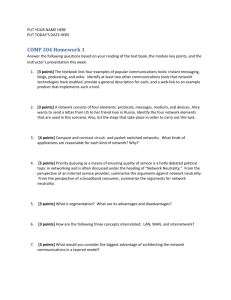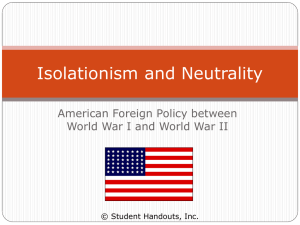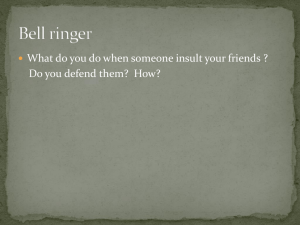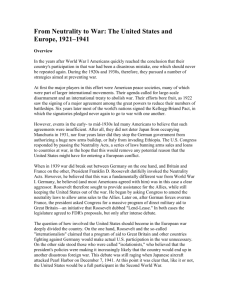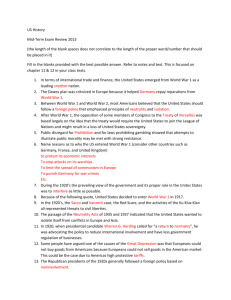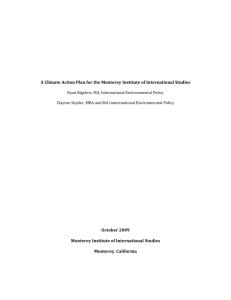Peter de Marneffe
advertisement
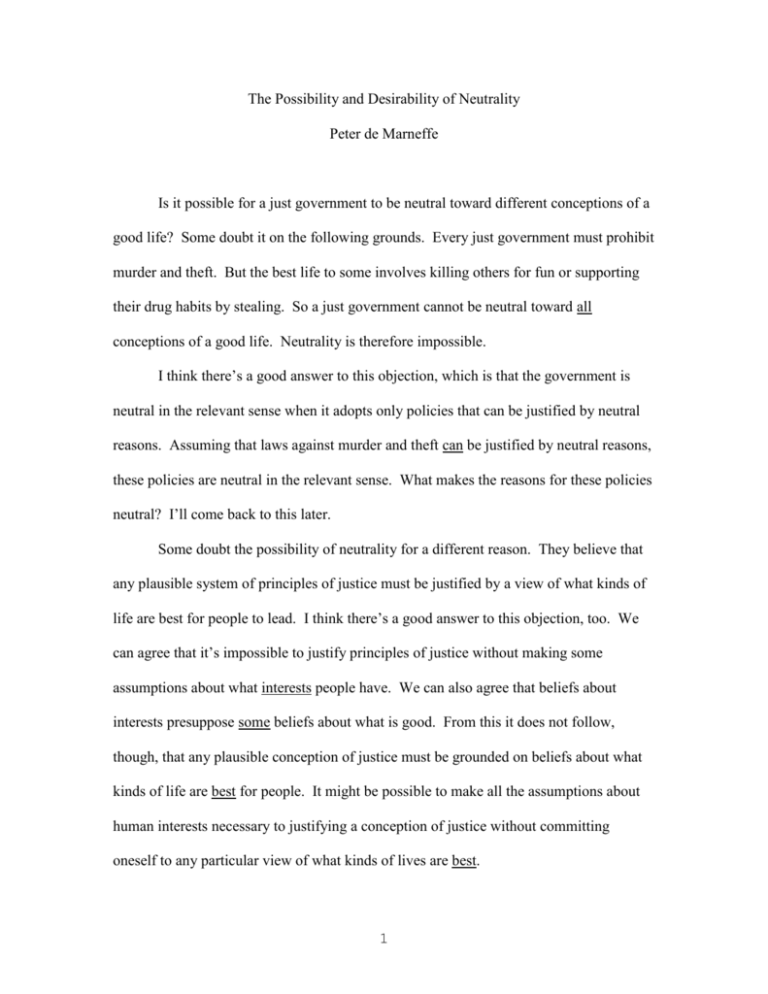
The Possibility and Desirability of Neutrality Peter de Marneffe Is it possible for a just government to be neutral toward different conceptions of a good life? Some doubt it on the following grounds. Every just government must prohibit murder and theft. But the best life to some involves killing others for fun or supporting their drug habits by stealing. So a just government cannot be neutral toward all conceptions of a good life. Neutrality is therefore impossible. I think there’s a good answer to this objection, which is that the government is neutral in the relevant sense when it adopts only policies that can be justified by neutral reasons. Assuming that laws against murder and theft can be justified by neutral reasons, these policies are neutral in the relevant sense. What makes the reasons for these policies neutral? I’ll come back to this later. Some doubt the possibility of neutrality for a different reason. They believe that any plausible system of principles of justice must be justified by a view of what kinds of life are best for people to lead. I think there’s a good answer to this objection, too. We can agree that it’s impossible to justify principles of justice without making some assumptions about what interests people have. We can also agree that beliefs about interests presuppose some beliefs about what is good. From this it does not follow, though, that any plausible conception of justice must be grounded on beliefs about what kinds of life are best for people. It might be possible to make all the assumptions about human interests necessary to justifying a conception of justice without committing oneself to any particular view of what kinds of lives are best. 1 If you’re unconvinced by this possibility, you should recognize that there is still a sense in which neutrality is possible. To see this, one should distinguish two different levels of neutrality, legislative and foundational. The legislative principle of neutrality is that the government should not adopt a coercive policy unless it can be justified by neutral reasons. The foundational principle of neutrality is that a conception of justice, including principles of liberty such as the principle of legislative neutrality, is valid only if it can be justified without making any assumptions about what kinds of life are best for people.1 If no principle of justice can be justified without making assumptions about what kinds of life are best, then foundational neutrality is impossible. It does not follow that legislative neutrality is impossible since the correct view of the best human life might warrant the principle of legislative neutrality as a valid principle of political justice.2 It is also true that the foundational principle of neutrality might be valid even though the legislative principle is not. This is because a neutral foundation might identify decisive reasons to reject the principle of legislative neutrality.3 The possibility of legislative neutrality is therefore a separate issue from the possibility of foundational neutrality. My primary claim so far is that legislative neutrality is possible. Even if it’s possible, though, it might still be undesirable. Even if it’s possible for the government to adopt only policies that can be justified by neutral reasons, some morally justifiable policies might be justified only by non-neutral reasons. Suppose, to illustrate, that In “Liberalism, Liberty and Neutrality,” Philosophy & Public Affairs 19 (Summer 1990): 253-274, at 253, I drew a similar, but not identical, distinction between “neutrality of grounds” (similar to “foundational neutrality”) and “concrete neutrality” (similar to “legislative neutrality”). 2 Ronald Dworkin suggests a similar defense of legislative neutrality in his Tanner lecture, where he says that he hopes to derive neutrality “as a theorem” from a general conception of a good human life that he calls “the model of challenge.” See Dworkin, “Foundations of Liberal Equality,” in Stephen Darwall, ed., Equal Freedom (Ann Arbor: The University of Michigan Press, 1995), pp. 190-306, pp. 209, 194. 3 This is the position I inclined to in “Liberalism, Liberty, and Neutrality.” I now believe that I there misinterpreted the principle of legislative neutrality and that in some form this principle is valid for the reasons given below. 1 2 environmental protection laws or government funding for the arts can be justified only by non-neutral reasons. If these policies are nonetheless morally justifiable, then legislative neutrality is undesirable. There is, however, also a simple response to this objection, which is that any morally justifiable policy can be justified by neutral reasons. We can argue, for example, that environmental protection laws and funding for the arts can be justified as advancing our interests in having certain opportunities, and count these interests as neutral reasons. Why should we count these reasons as neutral? Well, for one thing, they don’t appear to be the kind of reason that defenders of neutrality have meant to exclude. Here’s a list of reasons that defenders of neutrality have meant to exclude. This list includes a number of reasons for the government to limit a person’s liberty, including the reason (1) that a person’s conception of a good life is false, or contains false propositions about what is good or valuable; (2) that by expressing some belief or attitude a person makes it more likely that someone else will form a false evaluative belief, about politics, religion, philosophy, science, art, or about how best to live; (3) that by engaging in an activity a person will displease God, or create distance between herself and God, or make herself worse off in the afterlife; (4) that by pursuing a goal or by engaging in an activity a person will live a life that is less than the best or most excellent life that she could have led; (5) that by pursuing a goal or by engaging in an activity a person will not develop and exercise her higher human capacities as fully as she might have throughout her life; 3 (6) that what a person wishes to do is impersonally wrong or bad, in the sense that it is wrong or bad independent of its negative effects on anyone; (7) that the goals a person wishes to pursue or the activities she wishes to engage in are inherently worthless; (8) that by pursuing a goal or by engaging in an activity a person becomes less admirable; (9) that others disapprove of the goals a person wishes to pursue or the activities she wishes to engage in; (10) that the activities a person wishes to engage in are inherently shameful, base, or degrading; (11) that what a person wishes to do, or be, or become, or have, or create is ugly or otherwise aesthetically objectionable; (12) that by doing something a person fails to treat with due care or respect something precious, such as the capacity for sexual intimacy, or sacred, such as potential human life. Since these are reasons that defenders of neutrality have meant to exclude as nonneutral, I will now refer to them as “non-neutral reasons,” without yet explaining what makes them non-neutral. Environmental protection laws and funding for the arts protect or provide certain opportunities. Some of the good reasons there are for people to want these opportunities are not on this list of non-neutral reasons, and they are different in character from the reasons on this list. So it makes sense to assume, at least tentatively, that these reasons are neutral in the relevant sense. Assuming, then, that these reasons can justify these policies, these policies are permitted by the principle of legislative 4 neutrality. Obviously this doesn’t prove that legislative neutrality is desirable, since there might be other morally justifiable policies that cannot be justified by neutral reasons. It’s also possible, though, that every morally justifiable policy can be justified by neutral reasons, in which case legislative neutrality is not only possible, but also desirable. I think something close to this is true. Here is a principle of legislative neutrality that I believe is valid. It holds that the reasons on the above list of non-neutral reasons cannot, on their own, either singly or in combination with each other, justify the government in limiting an important individual liberty; coercive government policies of this kind can be justified only by reasons not on this list (although possibly in combination with reasons that are on this list). Why do I think this principle is valid? The short answer is that the non-neutral reasons on this list seem to me to be too weak on their own, either singly or in combination, to justify the government in adopting any policy that limits an important individual liberty, given the value of liberty. Furthermore I believe this judgment can be defended on the basis of the following general conception of political justification. According to this conception, a reason can justify the government in limiting an important liberty only if it meets three conditions: (1) it is a personal reason or a set of such reasons; (2) there is sufficient epistemic reason to accept the propositions that constitute this personal reason or set of reasons; (3) this personal reason or set of reasons is not decisively outweighed by any personal reason against the government limiting individual liberty in this way. I believe these conditions on reasons could be defended as valid within the kind of contractualist framework that Scanlon defends, and I believe this framework is substantially correct. I also believe that the reasons on the above list of non-neutral reasons, taken on their own, 5 either singly or in combination, violate at least one of these conditions when taken as reasons to limit important liberties. This is why I think the principle of legislative neutrality is valid. I have just made a number of controversial assumptions and I won’t try to defend them here. My primary aim in sketching this rationale for legislative neutrality is just to indicate a way in which this principle might be defended. One noteworthy feature of this defense, however, is that it does not use the notion of neutrality itself to explain why the principle of neutrality is valid. In other words it does not use the notion of neutrality itself to explain why non-neutral reasons are insufficient to justify the government in limiting an important liberty. Nor does it use related notions of impartiality or fairness. It simply says that the reasons that defenders of non-neutrality have meant to exclude are too weak to justify the government in limiting important liberties. My reasons for wanting not to rely on the notion of neutrality in defending neutrality will shortly become clear. The defense of legislative neutrality that I have just sketched presupposes a classification of some reasons as neutral and others as non-neutral. But I haven’t said much in defense of this classification. I’ve identified non-neutral reasons only by a list, and I’ve said that these are reasons that defenders of neutrality have meant to rule out, but I haven’t yet explained what makes these reasons non-neutral. This might strike you as a gaping hole in my defense of neutrality. You might think that an adequate defense of legislative neutrality requires not only the claim that every morally justifiable policy can be justified by neutral reasons, but also an analysis of the distinction between neutral and non-neutral reasons that justifies us in counting every reason as neutral that is necessary 6 to justify a morally justifiable policy. So at this point I must finally admit that I’m unable to find a satisfactory analysis of the distinction between neutral and non-neutral reasons. Perhaps it seems obvious to you what makes a reason neutral or non-neutral. A reason is non-neutral, you might think, if and only if it implies that someone’s conception of the good life is false or unsound. Notice, though, that this analysis fails to identify as non-neutral some of the reasons that defenders of neutrality have clearly meant to exclude. Consider, for example, the reason to prohibit homosexual sodomy that a majority disapproves of it. Although this is one of the reasons that defenders of neutrality such as Dworkin have meant to exclude,4 taking majority disapproval to be a good reason to prohibit a form of conduct does not imply that anyone’s conception of the good life is false or unsound (not at least if “imply” has its normal logical meaning). There is no logical inconsistency in holding that in a democracy government officials are permitted to prohibit some conduct solely for the reason that a majority disapproves of it even if there is nothing objectively wrong with that conduct or nothing intrinsically bad about it. So this proposal fails to explain what all non-neutral reasons have in common. Another possibility is that neutral reasons are reasons constituted by interests, non-neutral reasons are those not constituted by interests. Interests, I will suppose, are constituted by personal reasons. A personal reason to want something is a reason for one to prefer one’s own situation when that thing obtains. An impersonal reason to want something is a reason to prefer a world in which this thing obtains, but not to prefer one’s own situation in this world. A person has an interest in something, then, when there is good reason for him to prefer his own situation when he has this thing. Neutral reasons, See Ronald Dworkin, “Liberalism,” A Matter of Principle (Cambridge, Mass.: Harvard University Press, 1985), pp. 181-204, at, p. 196; 4 7 one might think, are constituted by interests or personal reasons. This proposal, however, also fails because some interests provide non-neutral reasons. Consider, for example, the good reasons there are for children to prefer their situations when their school teachers do not teach them things that are highly improbable and for which there is no good evidence. This personal reason constitutes a genuine interest, but as a reason for the government to prohibit the teaching of biblical literalism in private schools, it seems non-neutral. One might say that that this reason is non-neutral because it is not actually sufficient to justify the government in prohibiting the teaching of biblical literalism. So perhaps we should identify non-neutral reasons with insufficient reasons. Not all insufficient reasons, though, are non-neutral. Imagine, for the sake of illustration, that there is insufficient reason, all things considered, for racial preferences in university admissions, as critics of this policy maintain. Does it follow from this that all the reasons for this policy are non-neutral, including the goal of ending racial injustice? This is certainly not how defenders of neutrality such as Dworkin have understood the idea. Observe, too, that if one were to identify neutral reasons with those that are sufficient to justify coercive government policies, then the notion of neutrality would not do any theoretical work in explaining why non-neutral reasons are insufficient. I believe the idea of neutrality was proposed partly to explain why certain reasons for government policies are illegitimate or otherwise insufficient. If a neutral reason just is a sufficient one, then the idea of neutrality has no explanatory role to play. At this point a student of Rawls’s political liberalism might suggest that Rawls’s idea of public reason provides a satisfactory analysis of the distinction between neutral and non-neutral reasons: neutral reasons are public reasons, non-neutral reasons are non- 8 public reasons. I believe this analysis also fails. This is because a public reason, as Rawls understands the idea, is a reason that is identified by some liberal, political conception of justice as sufficient to justify some coercive government policy, and a conception of justice might satisfy Rawls’s stated criteria for being liberal and political, and yet still identify a non-neutral reason as sufficient to justify a coercive government policy. To illustrate, consider an imaginary conception of justice that I will call “limited moral majoritarianism.” This conception of justice includes two fundamental principles of justice: Rawls’s principle of equal basic liberty5 and a principle of basic need that requires the government to ensure when feasible that the basic material needs of its citizens are met. This conception of justice also assigns these two principles “lexical priority” over the other principles it includes.6 Among these other principles, however, is a principle of moral majoritarianism, which directs the government to adopt policies that encourage activities that most people approve of as fine, noble, uplifting, intrinsically worthy, or most fitting for human beings, and to discourage activities that most people disapprove of as base, degrading, ignoble, intrinsically worthless, or otherwise unfitting, when these policies do not conflict with either of the two lexically prior principles just mentioned. This conception of justice is a liberal, political conception, as Rawls defines this idea.7 It does not permit the government to limit basic liberties to promote the moral 5 See John Rawls, Political Liberalism (New York: Columbia University Press, 1993), p. 5, for a statement of the final formulation. 6 For the notion of lexical priority, see John Rawls, A Theory of Justice (Cambridge, Mass.: Harvard University Press, 1971), p. 244. 7 In Political Liberalism, p. 223, Rawls identifies three criteria of a liberal conception of justice and three criteria of a political conception of justice. A conception of justice is liberal if and only if (1) it requires the government to recognize and protect an equal right of citizens to certain basic liberties; (2) gives the recognition and protection of these basic liberties priority over other goals, particularly maximizing the general welfare and promoting human excellence or perfection; and (3) requires the government to secure 9 views of the majority; it permits the government to limit only nonbasic liberties for this reason. It is therefore a liberal conception of justice, as Rawls defines this notion. It is also a political conception of justice. It is framed to apply only to government policy, and is not proposed as a general theory of personal conduct. It says only that, in addition to protecting basic liberty and promoting equality of opportunity and fairness in the distribution of resources, the government should act to promote human excellence and discourage human degradation as the majority understands these things. This conception of justice is also not based on any particular comprehensive religious or philosophical doctrine about life’s ultimate value, meaning, or purpose. To the contrary, the value of the government endorsing and advancing the moral beliefs of the majority, like the value of individual liberty, is presented as a freestanding political value, one that is not unique to any particular religious or philosophical view. Finally, it is possible to arrive at this conception of justice solely by reflecting on the ideals of liberty and equality that are implicit in the public political culture of a democracy. Political liberty is valuable, one might reasonably believe, partly because it empowers the majority to advance their moral beliefs through government policy. Limited moral majoritarianism, however, while it is a liberal, political conception of justice as Rawls defines this idea, would identify the fact that most people disapprove of an activity as intrinsically unworthy and degrading as a sufficient reason for the government to adopt a coercive policy that discourages it, which is a reason that defenders of neutrality such as Dworkin have meant to exclude as non- to each citizen the material means necessary to make effective use of these basic liberties. A conception of justice is political if and only if (1) it is framed to apply only to the basic political, economic and social institutions of a society; (2) its validity does not rest upon or presuppose the validity of any particular religious or philosophical doctrine about life’s meaning, value, or ultimate purpose; and (3) it may reasonably be arrived at by interpreting political ideas implicit in the public political culture of a democratic society. 10 neutral.8 Assuming, for example, that the freedom to purchase sexual services is not a basic liberty, and that most people think that prostitution is degrading, limited moral majoritarianism would identify this reason as sufficient to justify prohibiting the purchase of sexual services, as Sweden does, although this reason is non-neutral. Some nonneutral reasons thus appear to be public reasons, as Rawls specifies this idea, and the idea of public reason, as Rawls specifies it, cannot provide a satisfactory account of the distinction between neutral and non-neutral reasons. Perhaps I should make clear that in making this argument I am not claiming that Rawls, as a matter of psychological fact, would himself have considered the reason to prohibit the purchase of sexual services that the majority regards prostitution as degrading to be a public reason in his sense. My claim here is only that the specific theory of public reason that Rawls proposes—that public reasons are those identified as sufficient by some liberal political conception of justice when its principles are applied by using widely accepted methods of factual inquiry—fails to imply that all non-neutral reasons are non-public, because the criteria Rawls specifies for counting a conception of justice as liberal and political fail to exclude every conception of justice that identifies a non-neutral reason as sufficient. This is not an objection to Rawls’s idea of public reason on its own terms since he does not present this idea as a theory of neutrality. He presents it as part of a theory of legitimacy, according to which a coercive policy is legitimate in a democracy only if it would be enacted through a fair political process in which no one supports this policy unless he sincerely believes there is sufficient public reason for it. 9 Perhaps this test of legitimacy is sound. The limited point here is that the distinction 8 See Ronald Dworkin, Sovereign Virtue (Cambridge, Mass.: Harvard University Press, 2000), p.282 See John Rawls, “The Idea of Public Reason Revisited,” The University of Chicago Law Review 64 (Summer 1997):765-807. 9 11 between public and non-public reasons, as Rawls spells it out theoretically, fails to correspond to the intuitive distinction between neutral and non-neutral reasons, and so fails to provide a satisfactory analysis of this distinction. Elsewhere I have considered a number of other possible analyses of the distinction between neutral and non-neutral reasons, and I have found that they all fail to identify a morally relevant property that all and only the reasons on the above list of nonneutral reasons have in common.10 Although these reasons do share the property of being on this list, I have been unable to identify any morally relevant property that would justify placing them on this list, one that they do not share with some neutral reasons. From this I have tentatively concluded that there is no such morally relevant property. This might strike you as incredible. How is it, then, that we are able to pick out neutral and non-neutral reasons and roughly agree on which are neutral or non-neutral? I think there’s a good answer to this question. The principle of neutrality was originally advanced as a way of unifying a number of more specific principles of liberty--principles of freedom of expression, freedom of worship, sexual freedom, and other important liberties. In fact these more specific principles of liberty have less in common with each other than the unifying idea of neutrality suggests. We have nonetheless learned to make the distinction between neutral and non-neutral reasons on the basis of our beliefs about what reasons these other more specific principles of liberty permit and exclude. So although we are able to make an intuitive distinction between neutral and non-neutral reasons, this intuitive distinction fails to track any essential or constant difference between them. 10 “The Slipperiness of Neutrality,” Social Theory and Practice 32 (January 2006):17-34, pp. 28-30. 12 Liberal theorists of rights have been drawn to the idea of neutrality primarily for theoretical reasons. This idea seems to unify and explain the validity of a number of separate principles of liberty that liberals have endorsed on independent grounds. These include the principle that the government may not prohibit the expression of a political opinion for the reason that it is false or offensive; the principle that the government may not prohibit a form of worship for the reason that the religious beliefs on which it is based are false; the principle that the government may not limit these and other basic liberties against a person’s will for paternalistic reasons; the principle that the government may not limit these and other basic liberties for “moralistic” or “perfectionist” reasons. What all these illegitimate reasons have in common, one might think, is that the government would fail to be neutral toward different conceptions of a good life were it to limit basic liberties for any of these reasons. If so, the principle of neutrality offers a unified explanation of why all these reasons are illegitimate, which is that when the government limits basic liberties for these reasons it unfairly favors some pursuits of happiness over others and so treats its citizens unfairly. I doubt that the principle of neutrality can succeed in playing this unifying role in a theory of rights because there does not appear to me to be any morally relevant property that all and only non-neutral reasons have in common. When we examine the list of nonneutral reasons presented above, we find that these reasons differ in content and it seems that the government would therefore fail to be neutral in very different ways if it were to limit liberty for these reasons. If, as I suspect, there is no morally relevant property that all and only non-neutral reasons have in common, then the principle of neutrality cannot provide a unified theory of liberty in the way just sketched. For one thing, if there’s no 13 morally relevant property that all and only non-neutral reasons have in common, there’s no common property that can explain why all and only these reasons are illegitimate in violating the principle of neutrality. Secondly, if there is no morally relevant common property that all and only non-neutral reasons have in common, there is no simple and identifiable way in which the government would fail to act impartially or fairly in adopting policies for these reasons, and the idea of neutrality, with its implicit commitment to fairness and impartiality, fails to explain why all these reasons are illegitimate. So I am skeptical about the degree to which the idea of neutrality can provide an interesting explanation of why the diverse reasons that liberal theorists of rights regard as illegitimate are illegitimate. It is perfectly consistent with this skepticism, however, to believe that the principle of neutrality is valid in substance. It is perfectly consistent, in other words, with doubts about the theoretical value of neutrality to believe that the government is justified in adopting only coercive policies that can be justified by reasons not on the above list of non-neutral reasons. So the difficulty of finding a satisfactory analysis of the distinction between neutral and non-neutral reasons is no reason to believe that the principle of legislative neutrality is substantively invalid. In fact, the absence of a satisfactory analysis makes it much harder to refute the principle of legislative neutrality. In order to demonstrate that the principle of legislative neutrality is invalid one must demonstrate that the principle of neutrality excludes some morally justifiable policy. In order to demonstrate this one must demonstrate that there is some morally justifiable policy that can be justified only by non-neutral reasons. In order to demonstrate this one must demonstrate that the relevant policy cannot be justified by 14 neutral reasons. In order to demonstrate this one must identify the criteria for a reason being neutral or non-neutral. If there is no satisfactory analysis of this distinction, then it’s impossible to prove that the only reasons that can justify some morally justifiable policy are non-neutral. Or, to put the point another way, since the boundary between neutral and non-neutral reasons is unclear, it is always open to a defender of neutrality to identify as neutral whatever reasons are necessary to justify any policy that he agrees is morally justifiable. This was illustrated by the examples of environmental protection laws and government funding for the arts, discussed above. So far I’ve argued that although the idea of neutrality is theoretically unilluminating, there is a nonetheless a sense in which neutrality is both possible and desirable. In the time remaining I want to say something about the closely related issue of perfectionism. The principle of legislative neutrality is an anti-perfectionist principle in the following sense. It holds that the fact that an activity is not excellent or admirable or part of the best possible human life, or that it is shameful, base, or degrading, or that it inhibits the full development and exercise of the higher human capacities is not alone sufficient to justify the government in prohibiting this activity. This is the kind of anti-perfectionism that liberal theorists from Mill to Rawls and Dworkin all endorse, at least in some form. The term perfectionism, however, is also sometimes used much more broadly to characterize any theory of justice that is grounded on an objective conception of human interests. On an objective conception, a person has an interest in something if and only if there is good reason for him to want it. On a subjective conception, in contrast, a person has an interest in something if and only he actually wants it or would want it if 15 adequately informed, regardless of whether there is good reason for him to want it. Mill, Rawls, Dworkin and other leading liberal theorists rely on an objective conception of human interests in reasoning about political justice. So they are all perfectionists if the term “perfectionist” is properly applied to any view of this kind. This may create the illusion that they are all guilty of some kind of inconsistency, since it seems inconsistent for an anti-perfectionist to be a perfectionist. The apparent inconsistency vanishes, however, once we recognize that the anti-perfectionism of Mill, Rawls, and Dworkin is perfectly compatible with their endorsement of an objective conception of human interests. Partly to avoid the illusion of inconsistency here, I believe we should not use the term “perfectionist” to refer to objective conceptions of human interests. We avoid confusion if, in discussing conceptions of political justice, we apply the term “perfectionist” only to conceptions of justice of which the following is true: they hold that it is a proper function of government to encourage activities that are the most excellent, admirable, and fine; that this goal may permissibly be advanced by discouraging activities that are less than the most excellent, admirable, and fine; and that the government may discourage these activities by limiting individual liberty. Although Mill, Rawls, and Dworkin all accept an objective conception of human interests, they all consistently reject perfectionism in this sense. There are, admittedly, some features of Mill’s view, beyond his endorsement of an objective conception of human interests, that might reasonably be labeled “perfectionist.” One of these is his view that human development is a proper goal of government policy, a goal Mill himself sometimes identified as “human perfection.” 16 Another is Mill’s view that liberty is necessary for individuality, which in turn is an essential component of a good human life. In virtue of these features of Mill’s view, we might characterize Mill’s liberalism as a “perfectionist liberalism” in contrast to Rawls’s “political liberalism.” But if we do, it is important to recognize that these two aspects of Mill’s view are nonetheless perfectly compatible with the anti-perfectionism implicit in the principle legislative neutrality. This is because it is perfectly coherent to hold that human development generally and individuality specifically are best promoted by observing the principle of legislative neutrality, as Mill appears to have believed. I’ve just claimed that Mill, Rawls and Dworkin are all anti-perfectionists in endorsing the principle of legislative neutrality in some form. It’s important, though, to recognize a crucial difference between the principle of legislative neutrality, which they all accept, and the harm principle that Mill defends in On Liberty. Mill’s harm principle is that the government may not limit the liberty of an adult against his will unless this policy can be justified as preventing harm to others.11 The principle of legislative neutrality is that the government may not limit the liberty of an adult against his will unless this policy can be justified by neutral reasons. Since some paternalistic reasons might be neutral reasons, the principle of neutrality might permit paternalistic policies that Mill’s harm principle rules out. This should be seen as a selling point of the principle of neutrality. Many admirers of Mill, including Hart, Rawls, and Dworkin, have accepted the anti-moralistic and anti-perfectionist implications of Mill’s harm principle, but they have 11 J.S. Mill, On Liberty, ed. Elizabeth Rapaport (Indianapolis: Hackett Publishing Co, 1978), p. 9. 17 doubted that paternalism is always wrong.12 If paternalism is sometimes permissible, as most contemporary liberal theorists seem to believe,13 then the principle of legislative neutrality is superior to Mill’s harm principle as general principle of liberty, since it has the anti-moralistic and anti-perfectionist implications of Mill’s harm principle without its extreme anti-paternalism. In this connection it’s worth pointing out a common misunderstanding of what anti-perfectionism entails. Advocates and critics of neutrality commonly assume that it rules out drug and prostitution laws. This would be the case if the only reasons for these laws were perfectionist ones. If, for example, the only reason for prostitution laws were that prostitution is degrading, and if to say that prostitution is degrading is just to say that prostitution lowers the quality of a person’s life in making it less excellent or admirable, then prostitution laws would be ruled out by the anti-perfectionism implicit in legislative neutrality. This, however, is not the only reason for prostitution laws. Opponents of legalizing prostitution argue that it is inherently dangerous and psychologically traumatic; that it interferes with emotional development and well-being; that it results in the loss of important social, educational, and economic opportunities; that it causes lasting feelings of hopelessness and self-hatred; and that in these ways it typically has a lasting negative 12 See H.L.A. Hart, Law, Liberty, and Morality (Stanford: Stanford University Press, 1963), pp. 4-6, 31-33; Ronald Dworkin, Life’s Dominion (New York: Vintage Books, 1994), pp. 192-193; Ronald Dworkin, Thomas Nagel, Robert Nozick, John Rawls, Thomas Scanlon, and Judith Jarvis Thomson, “Assisted Suicide: The Philosopher’s Brief,” The New York Review of Books XLIV (March 27, 1997): 41-47, pp. 46-47; and Rawls, A Theory of Justice, p. 249. 13 See, too, Thomas Nagel, “Moral Conflict and Political Legitimacy,” Philosophy & Public Affairs 16 (Summer 1987):215-240, p. 224; and T.M. Scanlon, “A Theory of Freedom of Expression,” The Difficulty of Tolerance (New York: Cambridge University Press, 2003), p. 20. Even Joel Feinberg, who is perhaps the best known contemporary anti-paternalist, seems to allow some forms of paternalism since he allows paternalistic interference with choices that are not “voluntary” and he endorses an unusually demanding test of voluntariness that renders many acts “involuntary” that we would ordinarily think of as being voluntary. See Joel Feinberg, “Legal Paternalism,” Rights, Justice, and the Bounds of Liberty (Princeton: Princeton University Press, 1980), pp. 110-129, pp. 115-117. 18 impact on the lives of those who do it.14 If so, then there are good non-perfectionist reasons for laws that reduce the number of people who do sex work. The most common objection to prostitution, to be sure, is that it is degrading, and the claim that an activity is degrading is a perfectionist reason when it has a certain content. It is a perfectionist reason, for example, when the degradation in question consists solely in the fact, if it is a fact, that prostitution is inherently shameful. The claim that prostitution is degrading, however, might mean something else. It might mean that it typically has all the negative consequences just listed. Used in this way, the reason to reduce prostitution that it is degrading does not identify a perfectionist reason, since this reason does not presuppose that human excellence or perfection is a legitimate goal of government policy; it presupposes only that the government is properly concerned to reduce the kinds of harm just listed. If prostitution laws could be justified as reducing these harms, these laws would therefore be consistent with the anti-perfectionism implicit in legislative neutrality. I believe that drug laws could be defended along similar lines. To sum up: legislative neutrality is possible, since it is possible for the government to limit liberty only in ways that can be justified by neutral reasons. Furthermore, legislative neutrality in some form is desirable if the government is justified in limiting important individual liberties only by neutral reasons, which I believe is true. Foundational neutrality is also possible, in my opinion, since it is possible to recognize all the interests relevant to reasoning about justice and to give these interests their proper weight without assuming that any particular way of life is best. This is the good news for neutrality. The bad news is that the idea of neutrality is theoretically useless. The idea 14 See, for example, Cecilie Hoigard and Liv Finstad, Backstreets: Prostitution, Money, and Love (University Park: Pennsylvania State University Press, 1992). 19 of neutrality was introduced primarily to theorize the distinction between legitimate and illegitimate reasons for government coercion. The hunch was that whereas all legitimate reasons are neutral, an important class of illegitimate reasons is non-neutral, which explains their illegitimacy. This theory of legitimate reasons is unilluminating unless some morally relevant property is shared by all and only non-neutral reasons. As far as I can tell, there is no such property. If not, then although we should not abandon the political goal of neutrality for the reason that it is impossible or undesirable, we should abandon neutrality as part of a theory of rights since it fails to illuminate the crucial distinction between legitimate and illegitimate reasons. 20
